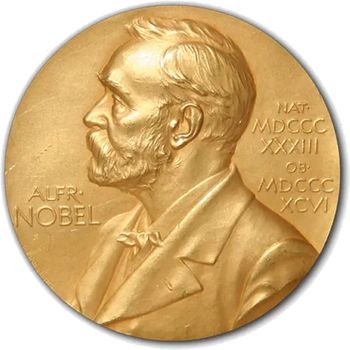Nobel seminar (October 2019)
Nobel Seminar
(or back to the Physics seminars page)
- What? The Nobel Prize in Physics
- Who? Prof. Fabrice Laussy – web & mail.
- Where? Wulfruna building (city campus), room MA030
- When? 16 October 2019, refreshments are available from 7.00pm, lecture starts at 7.30pm, we finish by 9.00pm.
- Why? To celebrate and honour the Nobel Prize in Physics of this year.
- How? The talk is one hour and open to questions — refreshments will be served.
- Chair: Dr. Anton Nalitov.
- Registration: (optional but recommended for catering) Get me some drinks.
Pre-Oct 8 Abstract: The Nobel Prize is synonymous with the most prestigious award that can be bestowed upon the human's endeavours to serve and advance humanity, from Peace to Literature and passing by the most fundamental of all Sciences: Physics. At such, it is one of the most highly regarded events in the Year, pointing at the latest directions in which the human's genius has been doing wonders. It is also a treasure trove of anecdotes, injustices, curiosities and mistakes that make the delight of everybody interested in what's buzzing in the highest intellectual circles, something between gossips and the History of Science. In this Lecture, Prof. Laussy will give his traditional Nobel Lecture where, along with the most crunchy bits of this socio-scientific celebration, he presents in layman's terms the Science honoured on this Year (recipients unknown at the time of writing but not at the time of Lecturing).

Post-Oct 8 Abstract: This Year's Nobel Prize goes to "contributions to our understanding of the evolution of the universe and Earth's place in the cosmos" for James Peeble's theoretical discoveries in physical cosmology and Michel Mayor & Didier Queloz's discovery of an exoplanet orbiting a solar-type star. These present two characteristic extrema in how Physics tackles the Universe, from highly sophisticated theoretical models that capture unfathomable complexity in their most intricate details, to fairly simple basic phenomena that work equally well with pulsars in the confines of the galaxy than with horning cars in the streets.
The Nobel Prize is also interesting for what it tells us about Scientists themselves. Being synonymous with the most prestigious award that can be bestowed upon the human's endeavours to serve and advance humanity, it is one of the most highly regarded events in the Year, pointing at the latest directions in which the human's genius has been doing wonders. It is also a treasure trove of anecdotes, injustices and curiosities that make the delight of everybody interested in what's buzzing in the highest intellectual circles, something between gossips and the History of Science. In this Lecture, Prof. Laussy will give his traditional Nobel Lecture where, along with the most crunchy bits of this socio-scientific celebration, he presents in layman's terms the Science honoured on this Year, namely, about our place in the cosmos.
